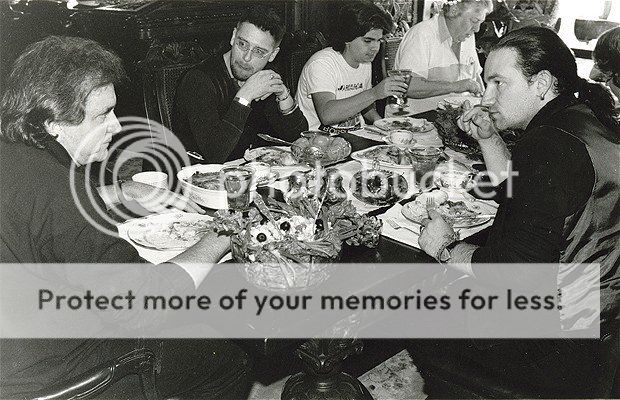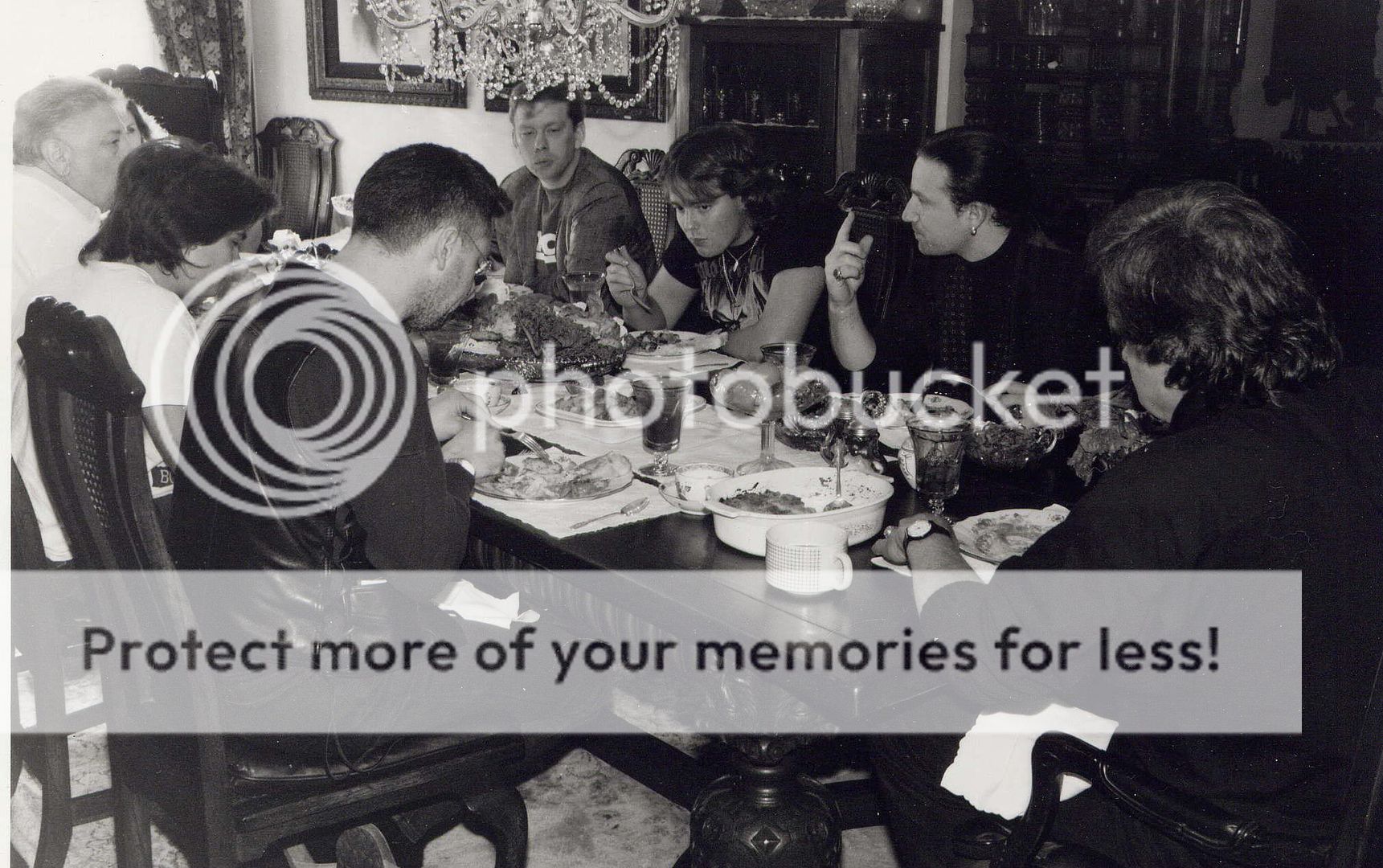Von Schloopen
Refugee
- Joined
- Feb 22, 2011
- Messages
- 1,100
am I supposed to feel bad for Kim Dotcom?
Hollow Island said:I recognize that artists have to do things now that they would not have done when radio and TV ruled. I understand why bands do stuff like that.
It just amazes me that you can't see a difference between taking money (not a full-on sponsor) from a TV channel that's part of the music industry and taking money from a phone company.
When MTV presents a show, the artists essentially takes money from an entity that promotes them and does nothing in return aside from tell people to watch their videos on MTV. When they take money from a phone company, they tell people to buy a phone. The phone might promote U2, but it is not analogous in any conceivable way to radio or MTV, which solely existed to play music (from artists with labels that paid to have music played...). It's apples and oranges.

Unequivocally, no.
They didn't have to; his (and the advertising media's) subsequent ability to list U2 as a major production reference when advertising other productions added weight to his growing resume/credibility...at a time, I might add, when he really needed a credibility boost in that scene due to his own troubles/investigations...it was win-win for both sides, for a number of reasons.
It doesn't change that he's a corporate sponsor who financed a U2 tour, in exchange for considerations. Now you're just splitting hairs over what those considerations were.
But the 90's and the 00's are apples and oranges as well. It amazes me that you are playing semantics with the amount of money taken and mediums. The music industry is not the same that it used be. We are delivered music differently. And one of those new ways is the smart phone. The smart phone industry is now part of the music industry, like it or not. They promote music, they build phones around music, and they invest in technologies that deliver music.
Hollow Island said:They never told anyone to buy a product before.
I'm not playing semantics. Advertising ipods and blackberries is the same as if they'd advertised walkmans or HMV, which they did not. Neither did they show up in the mid-inning commercial break telling me to watch MTV or Much Music, or listen to q107. You can call it "semantics" if you want, but the differences matter.
I know that the music industry isn't the same, that's why I'm not equating advertising phone companies to advertising music video channels and radio stations. They're completely different, and that's my point.
And if you want to talk about sponsorship, which is a nuanced concept (hence U2 not having a corporate sponsor on Zoo TV despite being presented by MTV), then you need to consider the different ways in which it occurs, the different responsibilities and obligations that are involved with advertising different products.

Advertising ipods and blackberries is the same as if they'd advertised walkmans or HMV, which they did not.
You had to buy cable in order to watch MTV. So yes they promoted a product.
Both had money that exchanged hands in order to have U2's name associated with their company, plain and simple.
No, it's not. Nope.
Hollow Island said:This argument would work if they'd put AT&T on their ticket. They weren't promoting cable. They were promoting - and being promoted by, every 10 minutes - a television channel everyone got, regardless of cable provider.
I like this trick of calling things "plain and simple" as a means to ignore complexity.
Hollow,
Was money exchanged?
Von Schloopen said:I also don't really know what you guys are fighting about.
Hollow Island said:Probably. Therefore they received sponsorship and it is the exact thing as selling phones. Show me a colour chart and I will only see squares of black and white. Also, an Iraqi had a rifle so they had weapons of mass destruction.
If you want to ignore nuance to make an argument that has no validity, feel free.
they don't even know at this point...
You mean I lack integrity?Panthers argument completely ignored this fact, and he's not the only one, people often glaze over that fact due to the fact that they like that era more. I was just pointing out his hypocrisy.
 )
)I think a lot of people feel like I do. We approve of U2 doing a one-off casual record with a good artist (like Johnny Cash -- someone they'd known for years by 1993 -- wandering into the Dublin studio and laying down a vocal, which then -- to his surprise -- ends up the last track on an album),

and we look with some suspicion on U2 doing a highly marketed single that rehashes an old song, collaborating with someone they'd probably never met and hadn't heard of, with Paul McGuinness's head spinning at the crossover marketing potential.
(For the record, I loved "The Saints Are Coming")


Does anyone know the real story of The Wanderer here?
Did U2 actually know Cash for any real period of time (years, even!) before he laid down the vocals for the song?
 But we do know they knew each other at least from what appears to be the late 80's or very early 90ish?.
But we do know they knew each other at least from what appears to be the late 80's or very early 90ish?. 


I just can't imagine being that cynical. Hearing a tune and analyzing it for it's cash grab angle. It's one thing not to dig it, but to analyze it with such an eye?
And it's origins are so organic. U2 play show in NYC. Soul singer from the Bronx invited to play in front of hometown audience. Song goes off. Crowd goes bonkers. Standing ovation. Mary J to U2: "That was great, let's cut that." And there you have it. That's about as rock and roll as it gets. Bless that MSG audience for going with the music and letting it move them. Their reactions are why that recording exists today. Can you imagine if they were cynics? "Oh, U2 don't know HER! U2 only know rock people. She sings non-rock music. This is a marketing exploit for cross-over material. Booo! Booo! Get off the stage!"
I don't.But we do know they knew each other at least from what appears to be the late 80's or very early 90ish?.


The Panther said:You mean I lack integrity?
As I've stated twice now (but which went over U2Girl's head, as usual), I HAVE NO ISSUE WITH U2 MAKING MONEY. I couldn't care less how much money they make, I'm not interested, and it's not my (or anyone's) business. They made heaps of money in the late 80s (The Joshua Tree was also referred to as "the money tree"), and it didn't bother me then (yes, I was around then) and it doesn't bother me now.
What does bother me -- and I'm only speaking for me, although again some of you can't seem to get your heads around that -- is how they attempt to make money now, and in recent years. I think this is very much fair-game for fans to comment on and even take issue with, because the way a big band markets itself directly impacts all consumers. It's how people learn about the group.
The Mary J. Blige thing is just one drop in the bucket -- we could erase it from history, and my current feelings would be unchanged. (By the way, someone tried to quote me as saying that U2 couldn't do "hip-hop" collaborations -- I didn't state or imply the word "hip-hop" anywhere in my posts, nor did I suggest that U2 can't do collaborations.)
I think a lot of people feel like I do. We approve of U2 doing a one-off casual record with a good artist (like Johnny Cash -- someone they'd known for years by 1993 -- wandering into the Dublin studio and laying down a vocal, which then -- to his surprise -- ends up the last track on an album), and we look with some suspicion on U2 doing a highly marketed single that rehashes an old song, collaborating with someone they'd probably never met and hadn't heard of, with Paul McGuinness's head spinning at the crossover marketing potential.
(For the record, I loved "The Saints Are Coming", but even I can see how that could turn some people off as well.)
I'm not sure the argument that I simply like that era better holds up, either. I actually prefer much of U2's 00's music to their 90s music, but I preferred their 1990s way of marketing themselves (well, pre-PopMart).
In the end, some of us probably feel that U2 are smart to sell themselves out as much as they possibly can, and some of us feel there is nuance to tastefully marketing yourself. Perhaps we can agree to disagree.

What exactly did you want me to have on a web forum -- a lollipop?We'll have to agree to disagree because all you really have is opinion.
So, these are a few examples of a few things I dislike much more than I dislike the Mary J. Blige record, which was nevertheless a travesty.

(Incidentally, I also think that issuing the B.B. King song as a single was sort-of in bad taste
